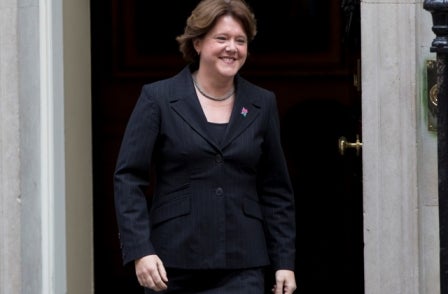
The Daily Telegraph claims that a special adviser to Culture Secretary Maria Miller warned the paper to consider her role in the Leveson Inquiry before publishing a story about her expenses.
Editor Tony Gallagher said the warning, which occurred during a private conversation with adviser Joanna Hindley, amounted to “not-so-subtle menaces”.
The incident has interpreted as a warning over the chilling effect the threat of Government involvement in regulation of the press is already having. The warning came as editors were meeting Prime Minister David Cameron and urged to implement the Leveson report recommendations on the future regulation of the press last Thursday.
The Telegraph reports that Hindley said she wanted to “flag up” the minister’s involvement in press regulation after reporters for the paper established that Miller’ parents lived in her taxpayer-funded second home.
It claimed that on Monday, Miller and her advisers initially refused to answer questions on the story and “indicated that this newspaper had timed its disclosures to overshadow Monday's announcement about same-sex marriage”.
It added:
The Telegraph has decided to disclose details of the private conversations amid widespread concern about the potential dangers of politicians being given a role in overseeing the regulation of the press.
This organisation first approached the Culture Secretary’s office on Thursday afternoon last week, a day before David Cameron announced that the Government would be backing gay marriage and allowing ceremonies to take place in some churches.
When a reporter approached Mrs Miller’s office last Thursday, her special adviser, Joanna Hindley, pointed out that the editor of The Telegraph was involved in meetings with the Prime Minister and the Culture Secretary over implementing the recommendations made by Lord Justice Leveson.
Hindley reportedly told the paper: “Maria has obviously been having quite a lot of editors’ meetings around Leveson at the moment. So I am just going to kind of flag up that connection for you to think about.”
She also told the reporter she should discuss the issue with “people a little higher up your organisation”.
She then “immediately contacted The Telegraph’s head of public affairs to raise concerns about the story”.
Tweeting about the incident last night, Gallagher wrote:
Maria Miller's expenses: the @telegraph reveals tmrw how her advisors warned us to consider her Leveson role before publishing her claims
— Tony Gallagher (@gallaghereditor) December 11, 2012
So we considered her Leveson role, published the story – and tomorrow we reveal the not-so-subtle menaces of her special adviser
— Tony Gallagher (@gallaghereditor) December 11, 2012
Hindley also accused the Telegraph of harassing Miller’s father John Lewis, but the paper claimed that: "In fact, reporters had a brief conversation with Mr Lewis in order to establish how long he had lived with Mrs Miller. Over the course of the conversation, Mr Lewis said he enjoyed reading The Telegraph."
A Culture Department spokesman said:
Mrs Miller’s special adviser raised concerns with a journalist about the nature of an approach to Mrs Miller’s elderly father.
Her advisor noted Mrs Miller was in regular contact with the paper’s editor and would raise her concerns directly with him.
However, this is a separate issue to ongoing discussions about press regulation. Mrs Miller has made the Government’s position on this clear.
Professor Brian Cathcart, executive director of Hacked Off, released a statement saying:
This story illustrates exactly why ministers must be kept at arm's length from the regulation of the press.
It cannot be right that politicians who are subject to the scrutiny of the newspapers and who are constantly vulnerable to public challenge in this way are sitting down with editors and proprietors of those same newspapers to design a press regulation system.
The direct involvement of ministers in these secret negotiations means no one can be confident that the public's interests are being served rather than the interests of the editors and proprietors, or of the politicians.
Lord Justice Leveson, after a thorough, year-long inquiry, proposed a mechanism that would operate independently and openly in the public interest. The Leveson plan means that politicians would have no direct personal involvement in regulating the press.
The judge in his report also called for absolute transparency of contacts between the press and the government about the report itself, as opposed to backroom deals and private conversations.
We do not want to see political influence in press regulation and this story highlights just that risk.
Email pged@pressgazette.co.uk to point out mistakes, provide story tips or send in a letter for publication on our "Letters Page" blog
